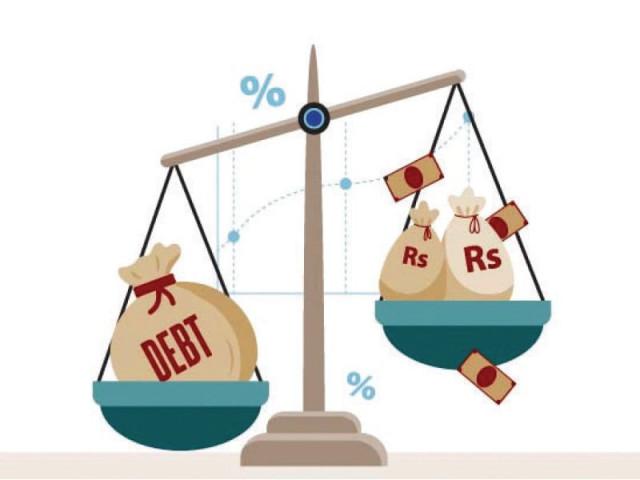Expenses shoot up 50% in 7 months
PM considers technocratic-bureaucratic model to run finance ministry

Expenditures of the federal government shot up 50% to Rs7.5 trillion during the first seven months of the current fiscal year, a challenge that the political leadership is planning to tackle through a technocratic-bureaucratic setup in the finance ministry.
As against expenses of Rs5 trillion during July-January of the last fiscal year, the federal government spent Rs7.53 trillion during the first seven months of the current year, according to sources.
Interest payments on the debt of Rs64.8 trillion came in at Rs4.66 trillion, or 65% of current expenditures.
Sources told The Express Tribune that despite making efforts, the growth in expenditures went above 50% mainly due to the wrong decision of pegging the interest rate with the headline inflation.
Pakistan has kept its interest rate at the highest level of 22% due to an agreement with the International Monetary Fund (IMF) to keep the rate positive against the headline inflation. This is now costing the federal government heavily in the shape of uncontrolled interest payments.
The interest payments of Rs4.66 trillion exceeded the net income of the federal government by Rs280 billion during July-January of fiscal year 2023-24, according to the sources.
Pakistan is far from achieving fiscal consolidation despite significantly slowing down development expenditures. Development expenses stood at only Rs211 billion in seven months, slightly lower than the last fiscal year.
The yawning deficit now stems from the IMF programme, which prevents the central bank from lowering the interest rate. The high rate has failed to curb inflation, which is in double digits above 20%.
Sources said that Prime Minister Shehbaz Sharif wanted to run the Ministry of Finance through a technocrat and his trusted bureaucrats.
Mohammad Aurangzeb, President of Habib Bank Limited, has started attending meetings on economic issues. PM Shehbaz has retained his trustworthy Imdad Ullah Bosal as Finance Secretary. Bosal is an experienced hand to assist any technocrat special assistant to the PM.
However, this arrangement may not serve Pakistan’s interests during talks with the IMF, as someone with strong negotiation capabilities will be required to deal with the global lender.
The IMF, in a recent correspondence with Pakistan, has listed further increase in taxes on the salaried and business individuals as a point of negotiation for the next programme review talks.
PM Shehbaz on Monday gave instructions to begin discussions with the IMF for a long-term Extended Fund Facility (EFF).
The Pakistan Muslim League-Nawaz (PML-N) is expected to finalise a short federal cabinet of about 20 ministers in the next few days. At least there would be two ministers from the MQM and one each from the Istehkam-Pakistan Party and PML-Q.
So far, there is no consensus in the party about bringing a politician as a full-time finance minister in place of the experienced Ishaq Dar.
The difficult situation requires a full-time finance minister to deal with the IMF as bureaucrats and technocrats can absorb the lender’s pressure to a certain extent.
The State Bank of Pakistan (SBP) reported on Tuesday that the federal government’s debt increased to Rs64.8 trillion by the end of January.
There was an increase of Rs4 trillion in the debt in seven months, which was Rs850 billion higher than the federal deficit despite appreciation of the rupee.
Sources said that the federal budget deficit, including interest payments, amounted to nearly Rs3.2 trillion, or 3% of gross domestic product (GDP), during the first seven months of FY24. The deficit was 40%, or Rs890 billion, higher than the same period of last year.
In its latest report, the IMF has not accepted Pakistan’s budget allocation of Rs7.3 trillion for debt servicing for the current fiscal year. Instead, it put the debt servicing cost at Rs8.61 trillion.
Overall, the federal government has managed to show a primary budget surplus of Rs1.93 trillion. The primary budget surplus is calculated after excluding interest payments, which now exceed the government’s net income.
There was a 51% increase in current expenditures, which amounted to Rs7.2 trillion in seven months. Over 50% increase in expenses shows that the Ministry of Finance cannot claim that it has achieved fiscal consolidation.
Non-tax revenues showed a substantial increase of 105% to Rs2.14 trillion compared to Rs1.1 trillion in the previous year, primarily due to petroleum levy collection and higher profits of the central bank.
The Federal Board of Revenue’s tax collection reached Rs5.15 trillion in seven months, up 30%.
Gross federal revenue receipts amounted to less than Rs7.3 trillion, an increase of Rs2.3 trillion from the previous year. However, the federal government’s total net income, after transferring provincial shares, stood at Rs4.4 trillion, not enough to finance interest payments.
Published in The Express Tribune, March 6th, 2024.
Like Business on Facebook, follow @TribuneBiz on Twitter to stay informed and join in the conversation.



















COMMENTS
Comments are moderated and generally will be posted if they are on-topic and not abusive.
For more information, please see our Comments FAQ